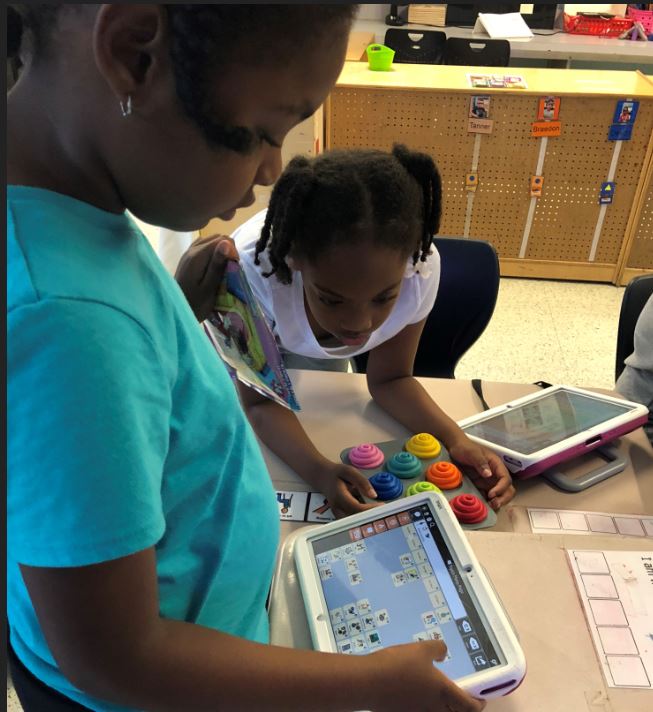
When Jacksonville, Florida’s Oak Hill Academy opened in 2016, some of its students ventured into a beautiful new world of communication. Though primarily non-verbal, these students are shaping their unique voices with their families, teachers and therapists leading the way. And Tobii Dynavox Indi speech tablets with Snap + Core First symbol-based AAC software are the main tools moving them along.
“It’s been a fast, rewarding ride,” said Megan Stewart, a speech-language pathologist at the public Duval County school for elementary students with autism. Some of her students started with no functional communication skills.
“We believe in the potential of these kids, in their ability, want and need to communicate with us,” Mrs. Stewart said. “We don’t expect their disabilities to get in the way.” The technology complements Oak Hill’s commitment to individualized learning. Because it is so intuitive, Mrs. Stewart says her students can put their thoughts into words right away.
Some snippets of their success:
While Imani Gray easily followed directions and engaged in activities, everyday communication gaps surfaced frequently. “We couldn’t keep up with what was in her head,” Mrs. Stewart said. The situation began to improve the first time Imani held her Indi. In a matter of seconds, she found the words in Snap + Core First to say she wanted to visit the ice cream store.
As a mom, Dhaima Gray simply wanted to erase the angst Imani felt while trying to communicate. The technology is helping with that. It’s “an outlet for her personality to shine through,” Dhaima said, adding, “Our mother-daughter relationship has blossomed.”
So has Imani’s friendship with Kayla Stallworth, her bestie at school. The girls take their Indis everywhere during the day, Mrs. Stewart said. Kayla’s father Kevin said she looks forward to playing with Imani and enjoys it more now that they can talk with each other as they type out their thoughts on the touch devices. At home, he said, Kayla often cried for lack of a way to make others understand her. “This device has leveled her desire to be understood and enhanced her use of her own words. Our favorite thing…is hearing her voice.”
Teacher Crystal Lucas can count on Kayla to use her device to ask for Imani each day. Mrs. Lucas likes hearing the girls make comments as well as requests. Kayla, for instance, said “I’m lonely” one day when Imani went for therapy. Once as the class listened to song about shapes, Imani turned to her Indi and said, “This is the worst song ever.”
Twins Devin and Donovan Walker also made a habit of crying when they wanted something. Or they pulled their parents and older sisters around the house. “It’s really heartbreaking to see when I just can’t figure it out,” their mother Alexis said. Their recent adoption of AAC technology is a welcome change.
When Devin saw his teacher with pizza, he used his Indi to ask for some. One day, Donovan led his mother to a kitchen cabinet, grabbing her arm. She intercepted, telling him to use his voice. So Donovan grabbed his Indi and expressed his desire to eat lunch. “It was actually dinnertime,” Alexis said, “but we count that as a win.”
She is happy for her boys.
“I think they themselves have a sense of how empowering it is to be able to speak.”
Source

